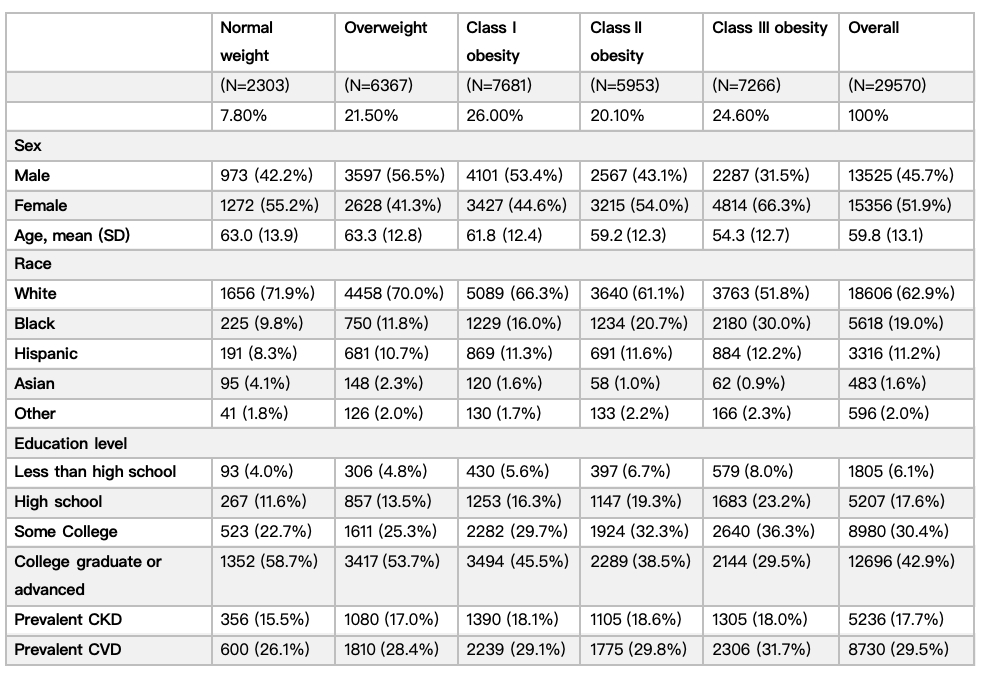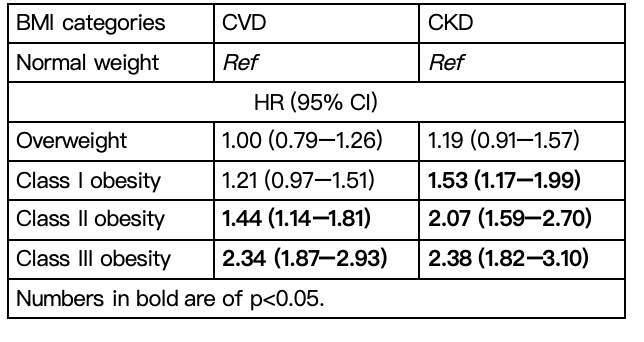Final ID: P3120
Obesity and the Risk of Advanced Stages of Cardiovascular-Kidney-Metabolic Syndrome among Obstructive Sleep Apnea Patients
Abstract Body: Background:
The cardiorenal metabolic (CKM) syndrome is a condition characterized by the interrelationship between the risk factors and relevant comorbidities. Obstructive sleep apnea (OSA) is associated with an increased risk of the advanced stages of CKM, cardiovascular disease (CVD) and chronic kidney disease (CKD). Obesity has been recognized as a significant risk factor for both the onset and worsening of OSA. However, it remains unclear whether the severity of obesity correlates with varying degrees of risk for CVD and CKD among patients with OSA.
Methods:
Using the most recent dataset from the All of Us Research Program, we included 29,570 participants with a BMI of ≥18.5 kg/m2, accessible electronic health records (EHR), and no prior history of OSA. BMI was assessed during physical examinations, and participants were categorized into normal weight, overweight, Class I, Class II, and Class III obesity based on World Health Organization criteria. We utilized the Systematized Nomenclature of Medicine to ascertain outcomes from the EHR, with CVD defined as a composite of heart failure, myocardial infarction, stroke, and atrial fibrillation. Cox regression models, adjusted for age, sex, race, and education, were employed to calculate hazard ratios (HRs) for CVD and CKD across the BMI categories in individuals with OSA.
Results:
The mean age of participants was 59.8 years (SD: 13.1), with females comprising 51.9% of the total sample. 70.7% were classified as with obesity. In general, compared to those with normal weight, participants with classes of obesity exhibited an increased risk of CVD and CKD; however, no association was observed between class I obesity and CVD. The risk increased with obesity severity. Class III obesity posed the highest risk, with a 2.34-fold increased risk of CVD (HR: 2.34, 95% CI: 1.87–2.93), a 2.38-fold increased risk of CKD (HR: 2.38, 95% CI: 1.82–3.10). Participants with overweight showed no statistically significant associations with incident CVD or CKD compared to those of normal weight.
Conclusions:
In patients with OSA, the risk of advanced stages of cardiorenal metabolic (CKM) syndrome, specifically CVD and CKD, progressively increases with more severe obesity. Our findings highlight the focused and effective weight management strategies, in addition to the regular treatment of OSA, to mitigate long-term CKM complications, ultimately aiding in the reduction of the complex and detrimental interplay of CKM.
The cardiorenal metabolic (CKM) syndrome is a condition characterized by the interrelationship between the risk factors and relevant comorbidities. Obstructive sleep apnea (OSA) is associated with an increased risk of the advanced stages of CKM, cardiovascular disease (CVD) and chronic kidney disease (CKD). Obesity has been recognized as a significant risk factor for both the onset and worsening of OSA. However, it remains unclear whether the severity of obesity correlates with varying degrees of risk for CVD and CKD among patients with OSA.
Methods:
Using the most recent dataset from the All of Us Research Program, we included 29,570 participants with a BMI of ≥18.5 kg/m2, accessible electronic health records (EHR), and no prior history of OSA. BMI was assessed during physical examinations, and participants were categorized into normal weight, overweight, Class I, Class II, and Class III obesity based on World Health Organization criteria. We utilized the Systematized Nomenclature of Medicine to ascertain outcomes from the EHR, with CVD defined as a composite of heart failure, myocardial infarction, stroke, and atrial fibrillation. Cox regression models, adjusted for age, sex, race, and education, were employed to calculate hazard ratios (HRs) for CVD and CKD across the BMI categories in individuals with OSA.
Results:
The mean age of participants was 59.8 years (SD: 13.1), with females comprising 51.9% of the total sample. 70.7% were classified as with obesity. In general, compared to those with normal weight, participants with classes of obesity exhibited an increased risk of CVD and CKD; however, no association was observed between class I obesity and CVD. The risk increased with obesity severity. Class III obesity posed the highest risk, with a 2.34-fold increased risk of CVD (HR: 2.34, 95% CI: 1.87–2.93), a 2.38-fold increased risk of CKD (HR: 2.38, 95% CI: 1.82–3.10). Participants with overweight showed no statistically significant associations with incident CVD or CKD compared to those of normal weight.
Conclusions:
In patients with OSA, the risk of advanced stages of cardiorenal metabolic (CKM) syndrome, specifically CVD and CKD, progressively increases with more severe obesity. Our findings highlight the focused and effective weight management strategies, in addition to the regular treatment of OSA, to mitigate long-term CKM complications, ultimately aiding in the reduction of the complex and detrimental interplay of CKM.
More abstracts on this topic:
A Retrospective Analysis of Chronic Kidney Disease and Arrhythmias-Related Mortality Among Adults in the United States (1999-2020): Insights into Disparities by Gender, Race/Ethnicity, and Geography
__PRESENT
Waseem Neha, Nouman Zainab, Chaudhry Sohaib Aftab Ahmad, Tariq Waleed, Khan Iftikhar, Shah Mazhar, Farooqi Hanzala Ahmed, Faiz Muneeb
Adverse Childhood Experiences (ACEs) and Cardiovascular Health: Future of Families and Child Wellbeing Study (FFCWS)__PRESENT
Pedamallu Havisha, Van Horn Linda, Stein James, Korcarz Claudia, Hansen Kristin, Mitchell Colter, Heard-garris Nia, Lloyd-jones Donald, Allen Norrina, Gauen Abigail, Ning Hongyan, Wilkins John, Goldman Noreen, Notterman Daniel, Hou Lifang, Zheng Yinan, Marma Amanda


